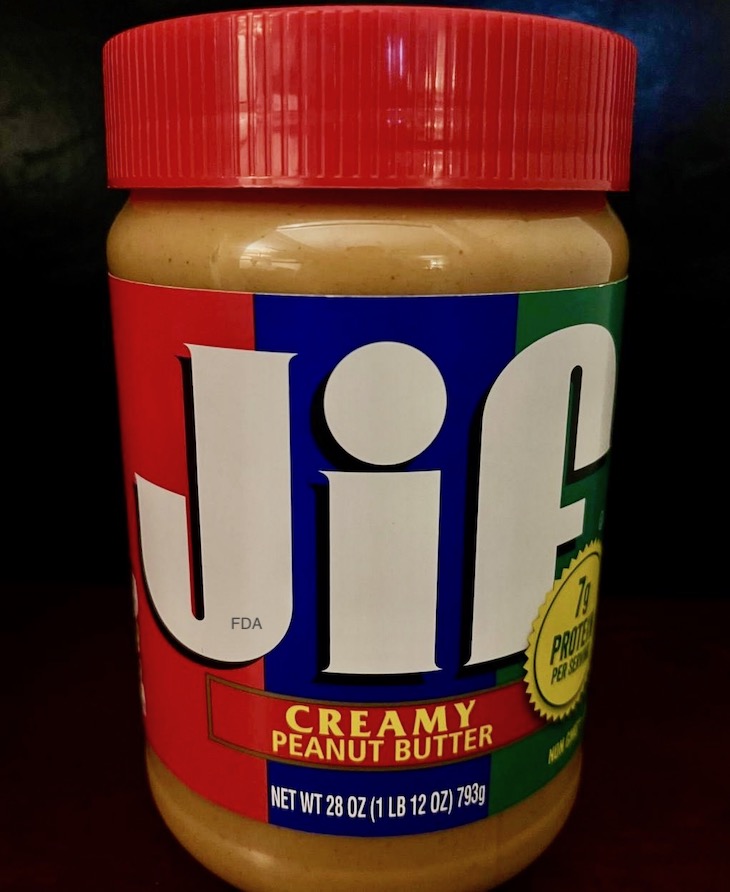How does peanut butter get contaminated with bacteria? A Salmonella Senftenberg outbreak linked to recalled Jif peanut butter has sickened at least 16 people in 12 states; two patients have been hospitalized. The case count by state is: Arkansas (1), Georgia (2), Illinois (1), Massachusetts (1), Missouri (2), Ohio (1), South Carolina (1), New York (1), South Carolina (1), North Carolina (2), Texas (2), Virginia (1), and Washington (1). Many recalls have been launched, including some types of the Jif product itself and more than a dozen secondary recalls.

While any product can be contaminated with pathogenic bacteria at any time during the supply chain, this outbreak is unusual because the outbreak strain of Salmonella Senftenberg was found in an environmental sample taken from the J.M. Smuckers Company plant in Lexington, Kentucky in 2010, 12 years ago. Some of the recalled peanut butter was made at that plant.
The statement on the CDC’s investigation page states, “WGS [whole genome sequencing] analysis shows that samples from sick people in this investigation are closely related genetically to a sample collected in 2010 from the environment at J.M. Smucker Company’s facility in Lexington, KY, where some Jif brand peanut butter is produced.” Has this pathogen been established in that facility for a dozen years? We don’t know.
How Does Peanut Butter Get Contaminated?
Peanut butter and other nut butters are made from raw agricultural ingredients that can be contaminated in the field through contact with bird and animal feces, or if a sick person handles the nuts. They can also be contaminated if irrigated with water that contains bacteria.
Contamination can also occur during processing. If just a few nuts are contaminated, when the nuts are ground the bacteria can spread throughout the product. And even if the nuts are roasted, which should kill pathogens, if bacteria is present in the facility, the product can pick up bacteria during processing and packing.
Bacteria can be present on production equipment, on floors, on contact surfaces, and can get onto the shoes and clothes of people who work in these plants. That’s why strict hygiene controls must be implemented according to the FDA’s Current Good Manufacturing Practices.
History of Peanut Butter and Nut Butter Outbreaks
And this is not the first time a Salmonella or other type of outbreak has been linked to peanut butter. This history stretches back more than a decade.
In 2009, a massive Salmonella Typhimurium outbreak linked to Peanut Corporation of America products sickened at least 714 people in 46 states. Those illnesses may have contributed to nine deaths. The product was served in long term care facilities, schools, and hospitals. Tests conducted in four states found Salmonella in that product. The peanut butter was also used to make dog treats and peanut butter crackers.
In 2012, at least 42 people in 20 states were sickened with Salmonella Bredeney infections after allegedly eating Trader Joe’s Valencia Peanut Butter that was manufactured by Sunland, Inc. of Portales, New Mexico.
In 2014, a Salmonella Braenderup outbreak linked to peanut butter made by nSpired Natural Foods and sold under various brand names including Whole Foods, Walmart, Safeway and Kroger sickened at least six people in five states.
In 2015, a Salmonella Paratyphi B variant L(+) tartrate (+) outbreak was linked to JEM raw brand sprouted nut butter spreads. At least 13 people in 10 states were sickened.
In 2017, an E. coli O157:H7 outbreak linked to I.M. Healthy Soynut Butter sickened at least 32 people in 12 states, most of them children. Twelve people were hospitalized, and nine developed hemolytic uremic syndrome (HUS), a type of kidney failure.
Can You Protect Yourself?
While it’s not possible to make contaminated peanut butter safe unless you cook it, you can protect yourself and your family by staying up to date on FDA and USDA recall notices and CDC outbreak investigation posts. Make sure that you avoid cross-contamination between foods that are eaten uncooked, such as peanut butter, and other foods such as raw meats and poultry.
And know the common symptoms of food poisoning so you can get help before a situation becomes serious.

If you have been sickened with a Salmonella infection after eating recalled Jif peanut butter, please contact our experienced attorneys at 1-888-377-8900 or text us at 612-261-0856. Our firm represents clients in lawsuits against grocery stores and food processors.




